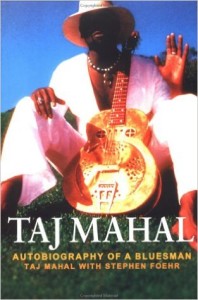 Born in New York, Henry Saint Clair Fredericks has been known as Taj Mahal for most of his sixty years. The original Taj Mahal is an icon of beauty and remembrance representing love and amazing craftsmanship which stands outside of Agra in India. Henry Fredericks, the other original Taj Mahal, is a living remembrance to the whole history of world music; he is a practitioner of the blues, reggae, African music, good ole’ rock ‘n’ roll — and he is one funky guy!
Born in New York, Henry Saint Clair Fredericks has been known as Taj Mahal for most of his sixty years. The original Taj Mahal is an icon of beauty and remembrance representing love and amazing craftsmanship which stands outside of Agra in India. Henry Fredericks, the other original Taj Mahal, is a living remembrance to the whole history of world music; he is a practitioner of the blues, reggae, African music, good ole’ rock ‘n’ roll — and he is one funky guy!
Autobiography of a Bluesman, by its title alone, continues the myth that Taj is a blues player. He is much more than that. His early albums presented a kind of seminar of the blues, with echoes of Howlin’ Wolf and Son House, but from his first recordings with the Rising Sons Taj proved impossible to categorize. West Indian rhythms, jazzy horn sections, and folk guitar picking all blend together in a rootsy stew. And the energy Taj pours into a performance is enough to keep everyone’s feet moving!
This energy translates fairly well onto the printed page. Co-author Stephen Foehr manages to stay in the background and allows Taj to tell his own story. Taj is honest enough with the facts to leave alone the details of questionable behavior raised by his friends and family. Whether he was the best father or husband in the world (and he wasn’t) is irrelevant as even those who criticize him can’t stop loving him. Taj’s personality and sheer essence leap off the page. The tributes from musicians like Bonnie Raitt, John Lee Hooker and Linda Ronstadt are heartfelt.
The book begins at the beginning, and delves into the terrible tragedy of the death of Taj’s father. In attempting to drive a tractor onto a trailer, Henry Fredericks, Sr., missed the rail, and toppled the tractor, and was crushed to death in his own yard. Young Taj was a witness. His spirit could have been destroyed by this event, but music kept him together and has continued to grow, even to the present day.
Stories are told of the early folk singing years, the meeting with Ry Cooder and the formation of the Rising Sons, and their rapid dissolution. Taj was signed as a blues artist to Columbia Records, but proceeded to surprise everyone by developing a pop sound. His interest in jazz led him to develop the tuba orchestra with Howard Johnson, which led to a couple of his most exciting albums, “The Real Thing” and “Happy To Be Just Like I Am.” This latter album introduced Taj’s interest in Caribbean music with steel drums and a familiarity with Bob Marley.
Taj’s other interests — fishing, gardening and animal husbandry — are all discussed. He is truly a renaissance man! His ex-wives and children all complain on one hand of his lack of focus as a husband or dad, and yet they all extoll his virtues as a loving, warm friend. Taj explains that he had to get out on the road and make a living … that was his job.
The structure of the book is chronological, with three sections of photographs inserted. The pictures are helpful, if not exciting. Foehr’s component, the chapter introductions and narrative bits are perfunctory and a tad repetitive. For instance chapters begin this way… “We’re at Seattle’s Jazz Alley…” “We’re standing at an outlook in Tilden Park…” “We’re riding in a car…” “We’re at the apartment…”
You get the idea. Even when he actually begins a chapter differently, it’s only a couple of sentences before he says…”We’re in a grocery store…” It becomes a little tedious, but soon the interviews with Taj take over and you are swept up in Taj’s natural ability as a showman and storyteller.
Taj Mahal is a national treasure. His record labels have all celebrated his legacy in recent months, offering a variety of anthologies and reissues. He continues to release new and varied music. This year he won a Grammy for his live album Shoutin’ In Key; he put out the second of his Hawaiian-influenced recordings on a small European label, and finally issued this book, Autobiography of a Bluesman. It isn’t perfect but it’s a darn good read, and a tribute to a major talent.
(Sanctuary Publishing, 2001)
